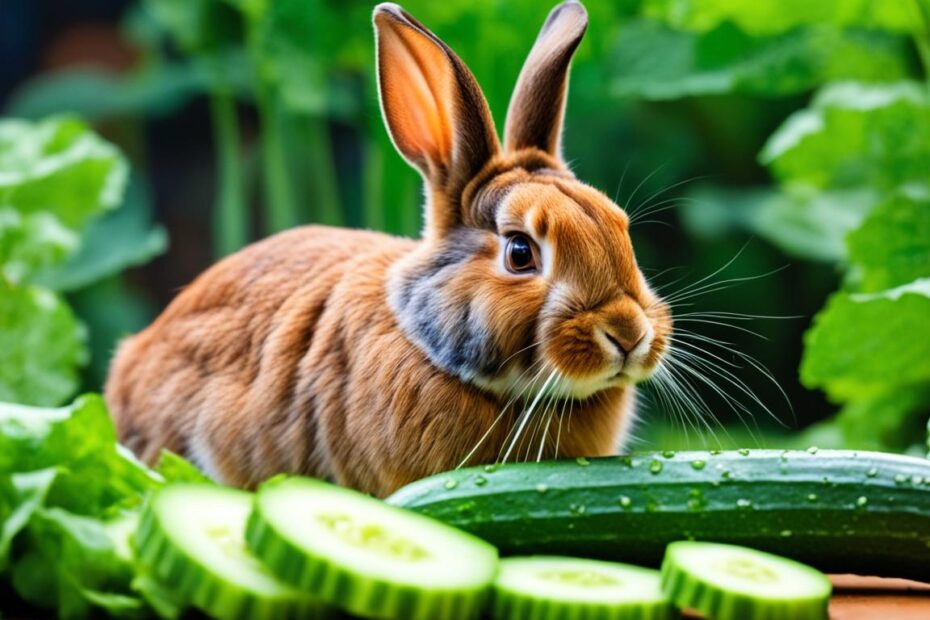Rabbits are adorable and curious creatures, and as pet owners, we always want to make sure we’re giving them the best possible care. When it comes to their diet, it’s essential to provide a variety of safe and nutritious foods. One question that often arises is whether rabbits can have cucumbers. Let’s explore this topic and discuss the effects of cucumbers on rabbits and the benefits of incorporating them into their diet.
Key Takeaways:
- Rabbits can eat cucumbers, but in moderation.
- Cucumbers should not replace the essential component of a rabbit’s diet, which is high-quality hay.
- It’s important to introduce cucumbers gradually and observe your rabbit for any negative reactions.
- Other safe vegetables for rabbits include artichoke leaves, cauliflower, peas, peppers, pumpkins, romaine lettuce, squash, and spring greens.
- Following a well-rounded diet and providing diverse treats ensure your rabbit’s nutritional needs are met.
What Do Rabbits Eat In The Wild?
In the wild, rabbits have a natural diet that is primarily plant-based. Their diet consists mainly of grass, which makes up around 80-90% of their daily intake. Grass serves as the primary food for rabbits and provides them with the essential nutrients they need for survival and optimal health.
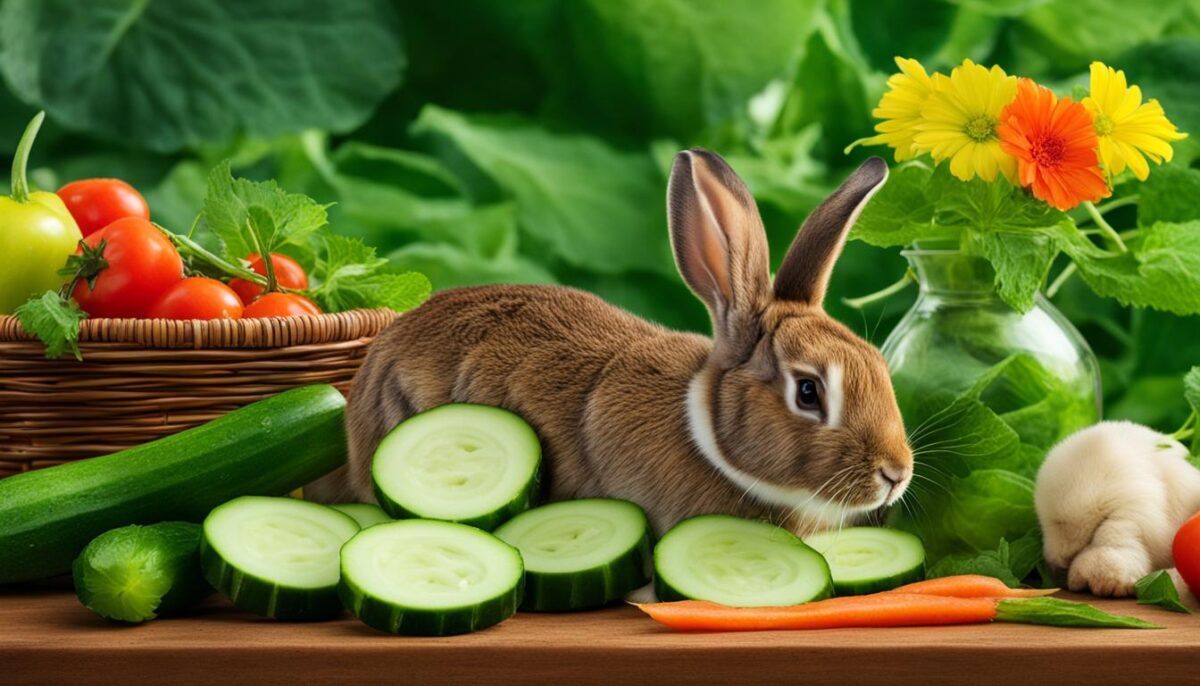
Health Benefits of Cucumbers for Rabbits
Cucumbers can offer some health benefits to rabbits when fed in moderation. They contain water and can help hydrate your rabbit, especially during hot weather. Additionally, cucumbers provide a refreshing and enjoyable snack option for rabbits, promoting mental stimulation and overall well-being.
Potential Dangers of Cucumbers for Rabbits
Although cucumbers are generally safe for rabbits, excessive consumption can lead to digestive issues. The high water content in cucumbers can disrupt the delicate balance of a rabbit’s digestive system, potentially causing indigestion and diarrhea. This can lead to dehydration and other health problems if not addressed promptly. It’s crucial to monitor your rabbit’s cucumber intake and ensure it remains within safe limits.
Cucumber and Rabbit Digestion
Rabbits have a unique digestive system that is adapted to their natural herbivorous diet. While cucumbers can be consumed by rabbits, they should not be a significant part of their regular diet. Cucumbers contain a high amount of water and minimal fiber, which can disrupt the delicate balance of a rabbit’s digestive system. It’s important to prioritize the consumption of hay, grass, and leafy greens, which provide the necessary fiber for proper digestion.
Water Content in Cucumbers
Cucumbers have a high water content, which can be both beneficial and potentially problematic for rabbits. The water in cucumbers can help keep rabbits hydrated, especially during warmer months. However, excessive intake of water from cucumbers can lead to diarrhea and dehydration. It’s essential to offer water-rich vegetables like cucumbers in moderation and ensure rabbits have access to fresh water at all times.
Potential for Indigestion and Diarrhea in Rabbits
Feeding rabbits excessive amounts of cucumbers can disrupt their sensitive digestive system, leading to indigestion and diarrhea. This can cause discomfort and dehydration, potentially leading to other health issues. It’s crucial to introduce cucumbers gradually and monitor your rabbit’s response. If you notice any digestive upset, such as changes in stool consistency or decreased appetite, it’s best to reduce or eliminate cucumber consumption.
Effects of Excess Cucumber Consumption in Rabbits
Excess cucumber consumption can have negative effects on a rabbit’s health. The high water content in cucumbers can cause diarrhea, leading to dehydration and electrolyte imbalances. Rabbit’s digestive systems are sensitive, and any disruption can lead to gastrointestinal issues. It’s important to prioritize a balanced diet for rabbits, consisting mainly of hay, grass, and leafy greens, and offer cucumbers as an occasional treat rather than a staple food.
| Health Benefits of Cucumbers for Rabbits | Potential Dangers of Cucumbers for Rabbits |
|---|---|
| – Hydration during hot weather | – Digestive issues if consumed in excess |
| – Refreshing and enjoyable treat | – Disruption of the delicate balance of the digestive system |
| – Mental stimulation and overall well-being | – Diarrhea and dehydration |
How To Properly Feed Your Rabbit Cucumbers
When it comes to feeding cucumbers to your rabbit, moderation is key. While rabbits can enjoy cucumbers as a treat, it’s important to remember that they should not replace the essential component of their diet – high-quality hay. Hay should make up around 80-90% of a rabbit’s diet and provide the necessary nutrients for their overall health and well-being.
When giving cucumbers as a treat, it’s best to offer a small amount, such as a couple of smaller slices, on a weekly basis. This helps prevent any digestive issues that can arise from consuming too much cucumber. Remember, rabbits have sensitive digestive systems, so it’s important to introduce new foods gradually and monitor your rabbit for any adverse reactions.
“Feeding cucumbers to rabbits in moderation ensures a well-rounded diet and supports their nutritional needs.”
In addition to hay, rabbits also require a varied diet that includes a mix of fresh vegetables, greens, and occasional fruits. However, it’s crucial to prioritize their hay consumption as it provides the essential fiber they need for proper digestion.
Hay provides several benefits for rabbits:
- It supports dental health by promoting natural chewing and grinding, preventing dental issues.
- It aids in maintaining a healthy weight by providing a low-calorie, fibrous food source.
- It prevents gastrointestinal stasis, a condition where the digestive system slows down or stops.
- It helps prevent the formation of hairballs, a common issue in rabbits.
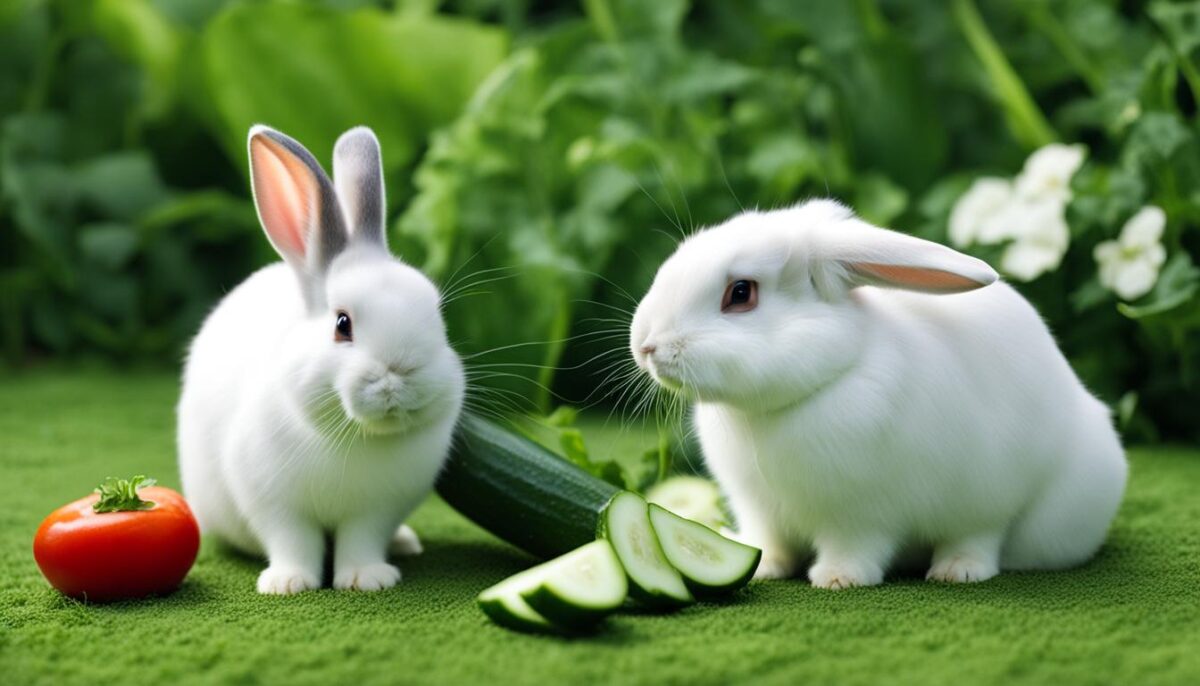
By ensuring that your rabbit’s nutritional requirements are met through a balanced and well-rounded diet, you can incorporate cucumbers as a safe and occasional treat. Remember, moderation is key, and the majority of their diet should consist of hay and other essential dietary components.
In summary, here is a table highlighting the nutrition requirements for rabbits:
| Nutrient | Daily Requirement |
|---|---|
| Fiber | 20-25% |
| Protein | 12-14% |
| Fat | 2-3% |
| Calcium | 0.5-1% |
| Vitamin A | 700-1,000 IU |
| Vitamin D | 200-400 IU |
Note: Always consult with a veterinarian to ensure you are meeting your rabbit’s specific nutritional needs based on their age, weight, and overall health.
Other Healthy Snacks For Your Rabbit
While rabbits can have a small amount of cucumbers as a treat, it’s essential to provide them with a diverse selection of snacks to ensure a well-rounded diet. Offering a variety of healthy treats not only keeps their diet interesting but also provides them with a range of nutrients. Here are some other safe and delicious snacks that your rabbit will love:
Favorite Bunny Snacks
1. Artichoke Leaves: Rich in fiber and antioxidants, artichoke leaves are a nutritious treat for rabbits. They can help support a healthy digestive system and provide essential vitamins and minerals.
2. Cauliflower: High in fiber and low in calories, cauliflower is a crunchy and tasty snack that rabbits enjoy. It’s also a good source of vitamin C and other beneficial nutrients.
3. Peas: Packed with protein, vitamins, and minerals, peas make a fantastic treat for rabbits. They can be served either fresh or frozen, but be sure to remove the outer shells before feeding them to your furry friend.
4. Peppers: Bell peppers, both red and green, are safe and nutritious options for rabbits. They are rich in vitamin C and provide a satisfying crunch that rabbits love.
5. Pumpkins: A seasonal favorite, pumpkins are a great source of fiber and beta-carotene. Offer small chunks or seeds as a treat for your rabbit, ensuring they are free from seasoning or additives.
6. Romaine Lettuce: Unlike iceberg lettuce, romaine lettuce is safe for rabbits and provides essential nutrients. It’s a leafy green that adds variety to your rabbit’s diet.
7. Squash: With its soft texture and mild taste, squash is a healthy option for rabbit treats. It’s rich in vitamins A and C, as well as fiber.
8. Spring Greens: A mix of different leafy greens, such as spinach, kale, and Swiss chard, can be a tasty and nutritious treat for rabbits. Just be sure to rotate the greens and offer them in moderation to maintain a balanced diet.
“Providing a diverse range of snacks is key to ensuring your rabbit enjoys a well-rounded and nutritious diet.”
Remember, when offering these treats to your rabbit, it’s important to provide them in small quantities. Treats should only make up a small portion of their overall daily diet, with the majority consisting of high-quality hay. By offering a variety of healthy snacks, you can provide your furry friend with a diverse and enjoyable eating experience.
| Treat | Nutritional Benefits |
|---|---|
| Artichoke Leaves | Rich in fiber and antioxidants, supports digestion |
| Cauliflower | High in fiber, low in calories, a good source of vitamin C |
| Peas | Protein-packed, rich in vitamins and minerals |
| Peppers | Provides vitamin C, adds crunch to the diet |
| Pumpkins | Source of fiber and beta-carotene |
| Romaine Lettuce | Leafy green, adds variety to the diet |
| Squash | Soft texture, rich in vitamins A and C |
| Spring Greens | Mix of leafy greens, provides varied nutrients |
Image:
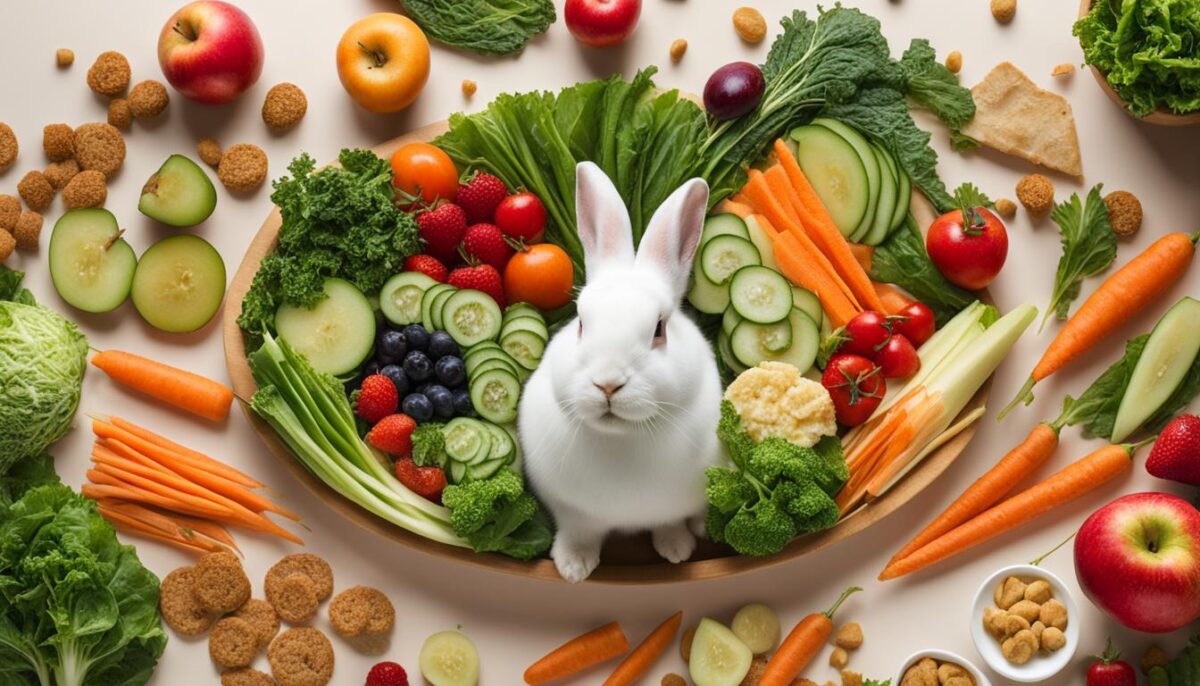
Important Considerations for Rabbit Treats
Rabbits have a sensitive digestive system, requiring careful attention when it comes to their treats. It’s important to understand the limitations and guidelines for providing treats to rabbits to ensure their overall well-being and prevent any digestive issues.
Limiting Treats for Rabbits
Rabbits should be given treats in moderation to prevent overindulgence and the associated health risks. The general guideline is to offer rabbits 1-2 tablespoons of treats per day, but this amount can vary depending on their size, activity level, and overall health. It’s best to consult with a veterinarian to determine the optimal treat quantity for your specific rabbit.
Portion Control for Rabbit Treats
It’s essential to consider portion control when offering treats to rabbits. Treats should only make up a small portion of their overall diet. The majority of a rabbit’s diet should consist of high-quality hay, along with a variety of fresh vegetables and limited amounts of fruits. This balanced approach ensures that rabbits receive the necessary nutrients without overloading their system with treats.
Weight-Based Treat Guidelines for Rabbits
The amount of treats given to rabbits should be based on their weight. Smaller-sized rabbits typically require fewer treats, while larger rabbits can handle slightly larger quantities. It’s essential to monitor your rabbit’s weight and adjust treat portions accordingly to maintain a healthy weight and optimal well-being.
Introducing New Foods to Rabbits
When introducing new foods to rabbits, including treats, it’s crucial to do so gradually. The sensitive digestive system of rabbits can struggle to adapt to sudden changes in their diet. Introduce new treats slowly, starting with small quantities and monitoring for any adverse reactions. This approach helps rabbits adjust to new foods without causing undue stress on their digestive system.
Safe Treat Choices for Rabbits
| Treat Options | Frequency |
|---|---|
| Carrot | Once or twice a week |
| Apple slices | Once or twice a week |
| Banana slices | Occasional treat |
| Papaya chunks | Occasional treat |
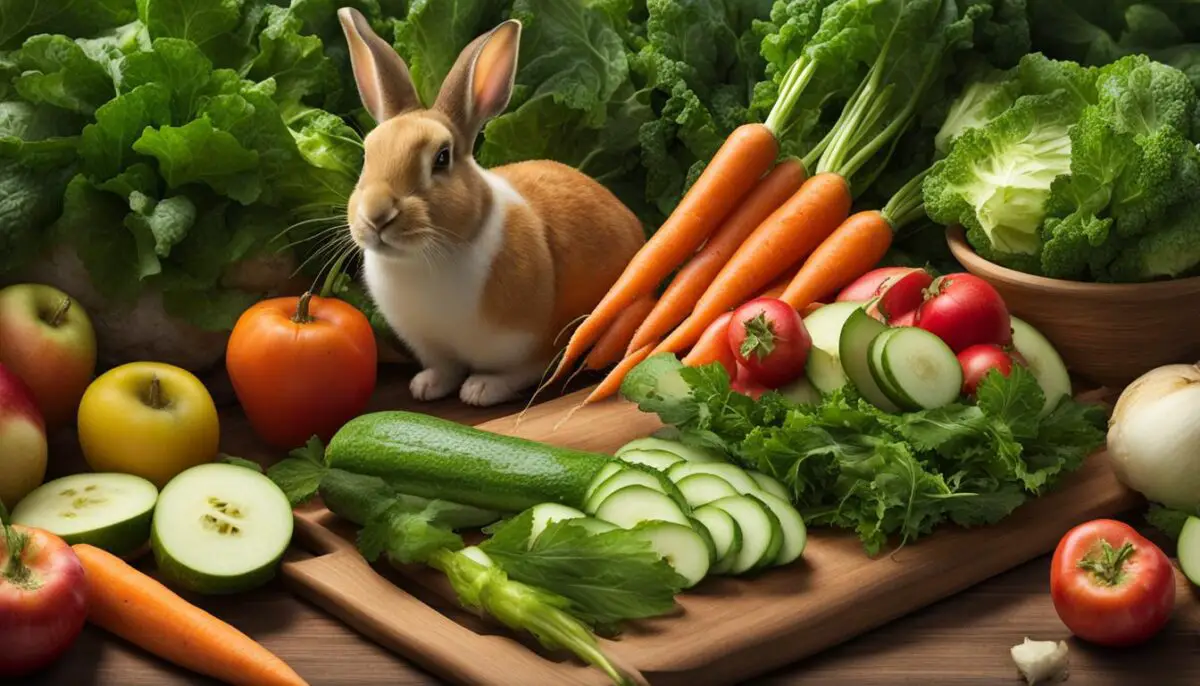
Remember, every rabbit is unique, and their dietary needs may slightly differ. It’s always best to consult with a veterinarian to create a personalized treat plan for your specific rabbit. By following these guidelines and being mindful of your rabbit’s sensitive digestive system, you can offer treats that enhance their enjoyment without compromising their health.
Alternatives to Cucumber Treats for Rabbits
While fresh treats are ideal for rabbits, there are several alternatives that have a longer shelf life. These options provide a variety of flavors and textures to keep your rabbit’s diet interesting. Here are some healthy and safe alternatives to cucumber treats for rabbits:
Baked Hay Treats
One option is to offer baked hay treats to your rabbit. Made primarily from timothy or alfalfa hay, these treats provide a crunchy and flavorful experience for your furry friend. Baking hay removes moisture while retaining the nutritional value, making it a nutritious and delicious snack option for rabbits.
Dried Herb Blends
Another alternative is dried herb blends. These blends combine a variety of herbs that rabbits enjoy, such as chamomile, parsley, and mint. Dried herb blends provide aromatic flavors and can be sprinkled over your rabbit’s food or offered as a standalone treat.
Dried Fruits and Vegetables
Rabbits can also enjoy dried fruits and vegetables as treats. However, it’s important to check the ingredients and ensure they are free from added sugars or unhealthy components. Opt for natural and organic options. Dried fruits and vegetables provide a concentrated flavor and can be a satisfying snack for your rabbit.
Homemade Treats
If you prefer to make treats for your rabbit, homemade options can be a great choice. You can use your rabbit’s regular pellets as a base and incorporate safe ingredients such as oats, carrots, and herbs. Homemade treats should be stored in the refrigerator to maintain freshness and used within a month.
When offering alternative treats to your rabbit, remember to do so in moderation. Treats should not replace the essential components of a rabbit’s diet, such as high-quality hay. It’s important to prioritize your rabbit’s health and well-being by providing a well-rounded and diverse diet.
Conclusion
In conclusion, it’s safe for rabbits to enjoy cucumbers as an occasional treat, as long as it’s done in moderation. While rabbits are herbivores, their diet should consist primarily of high-quality hay, which provides essential nutrients for their health. Adding a variety of safe fruits, vegetables, and leafy greens can complement their diet and offer additional nutritional benefits.
However, it’s important to remember that cucumber treats should not replace the core components of a rabbit’s diet. Consuming cucumbers in excess can lead to digestive issues, such as indigestion and diarrhea, due to their high water content.
To ensure the well-being of your rabbit, it’s crucial to follow proper feeding guidelines and offer a balanced range of treats. This includes providing a majority of hay, incorporating safe vegetables, and limiting treat consumption to avoid any adverse health effects.
By maintaining a proper rabbit diet and practicing moderation in treat consumption, you can promote your rabbit’s health and nutrition. Remember that a happy and healthy rabbit is a well-fed rabbit!
FAQ
Can rabbits have cucumbers?
Yes, rabbits can have cucumbers, but it should only be in small amounts.
What do rabbits eat in the wild?
In the wild, rabbits primarily eat grass, leafy weeds, and forbs.
What are the health benefits and dangers of cucumbers for rabbits?
Cucumbers are low in calories and nutrient-dense compared to a rabbit’s natural diet. While not toxic, the high water content can cause digestive issues if eaten in excess.
How should I properly feed my rabbit cucumbers?
Cucumbers should be introduced gradually and offered in small amounts as a treat. They should not replace a rabbit’s essential diet of high-quality hay.
What are some other healthy snacks for rabbits?
Other safe vegetables for rabbits include artichoke leaves, cauliflower, peas, peppers, pumpkins, romaine lettuce, squash, and spring greens.
What considerations should I keep in mind when giving treats to my rabbit?
Rabbits have sensitive digestive systems, so treats should be limited, and new foods should be introduced slowly.
Are there alternatives to cucumber treats for rabbits?
Yes, alternatives include baked hay treats, dried herb blends, dried fruits and vegetables, and homemade treats made with safe ingredients.


